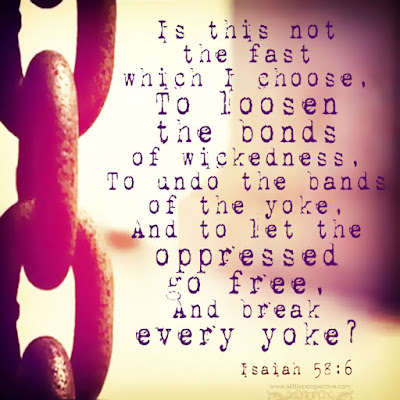1. On what day was a fast required in Old Testament law? (For your answer see Lev 23:26-32)
The only fast required was on the annual Day of Atonement. 10th month, 7th day They are to fast and offer sacrifices. Also, no work is to be done on this day, like a Sabbath.
2. In your own words, tell us what was wrong with the kind of fast being practiced?
The problem with the fast was that it was an outward fast that had no impact on their inward condition. In verse 3, he says that the people only think of themselves and treat their workers poorly. God does not value outward observance apart from inward connection.
3. In your own words, tell us the kind of fast the Lord chooses.
He is pleased with removing the chains of prisoners unjustly jailed, freeing those who are abused, sharing and giving to those in need, including your relatives.
4. Isaiah 58:13-14 contains a conditional promise regarding the Sabbath.
a. What are the conditions and what is the promise?
If you respect the Sabbath as a joyful day of worship and don't go around just doing whatever you please on that day, then you will truly enjoy knowing God. He will let you rule from the highest mountains and bless you with the land of your ancestor Jacob.
b. How can you trust the promise will be kept if the conditions are met?
"For the mouth of the Lord hath spoken it." v 14
Day Two: Read Isaiah 59
1. What has separated the people from God? Their iniquities and sins. Their hands are defiled with blood. Their lips have spoken lies and perverseness. It's interesting to think about the weight God gives to words here. They are on equal par with bloody hands (sinful actions). None call for justice or plead for truth (v.4). They trust in vanity, speak lies, and bring forth iniquity.
They are held accountable for not "calling" for justice---suggests there is sin associated with being a bystander too.
Iniquity--"avon" moral evil, perversity, to pant after nothingness (?) hard to get to the sense of this word here through Strongs.
'âven
From an unused root perhaps meaning properly to pant (hence to exert oneself, usually in vain; to come to naught); strictly nothingness; also trouble, vanity, wickedness; specifically an idol: - affliction, evil, false, idol, iniquity, mischief, mourners (-ing), naught, sorrow, unjust, unrighteous, vain, vanity, wicked (-ness.) Compare H369.
A noteworthy consequence:
"Sin prevents prayer from being answered (cf. Psa_66:18). Those sins included murder, lying, injustice (cf. Isa_59:9, Isa_59:11, Isa_59:14-15), and planning evil (Isa_59:3-4)." -BKCAnother reflection on sin in the Bibilical Illustrator:
The sad issues of sin
I. IT BRINGS SEPARATION. Instead of running to God, we flee from Him. His dazzling majesty appals us. His righteousness and purity compel us to hide from Him.
II. IT BRINGS DISENCHANTMENT AND DISILLUSIONMENT. For a little we arc fascinated, beguiled, befooled; but soon there is a rude awakening. “Their webs shall not become garments,” etc. (Isa_59:6). The mirage fades await and we discover to our dismay that there is nothing around or within us but a desert of sand and thorns.
III. IT BRINGS BEWILDERMENT AND PERPLEXITY (Isa_59:9). We are in doubt regarding the most elementary matters of belief and behaviour. (A. Smellie, M. A.)
2. Of what specific sins are they guilty? Bloody hands, untruthful lips, a disregard for truth and justice. Their paths are crooked with no peace.
3. How will the Lord's demand for justice be satisfied
"And he saw that there was no man, and wondered that there was no intercessor: therefore his arm brought salvation unto him; and his righteousness, it sustained him. For he put on righteousness as a breastplate, and an helmet of salvation upon his head; and he put on the garments of vengeance for clothing, and was clad with zeal as a cloak. According to their deeds, accordingly he will repay, fury to his adversaries, recompense to his enemies; to the islands he will repay recompense. -Isaiah 59: 16-18
"When the enemy shall come in like a flood, the Spirit of the LORD shall lift up a standard against him." Isaiah 59:194. Who is the "He" of verses 17-20 and what clothing will "He" put on? Jesus, garments of vengeance and zeal.
"He realized there was no one to intercede on her behalf. Isaiah was not saying that the Lord did not want to get involved, but that Israel was totally incapable of helping herself. Only God could help her. This is true of salvation in any era. No one can save himself. Only God can forgive sin and change a person’s heart." -BKC
"Like a warrior God goes forth to fight for His people. Righteousness is His breastplate and salvation is His helmet (cf. Paul’s use of this imagery in Eph_6:14, Eph_6:17). God’s other garments are vengeance and zeal. This verse (Isa_59:17) means that God supplies righteousness and salvation (cf. Isa_59:16) for His people as He zealously executes vengeance on His enemies (Isa_59:18)." -BKC



No comments:
Post a Comment